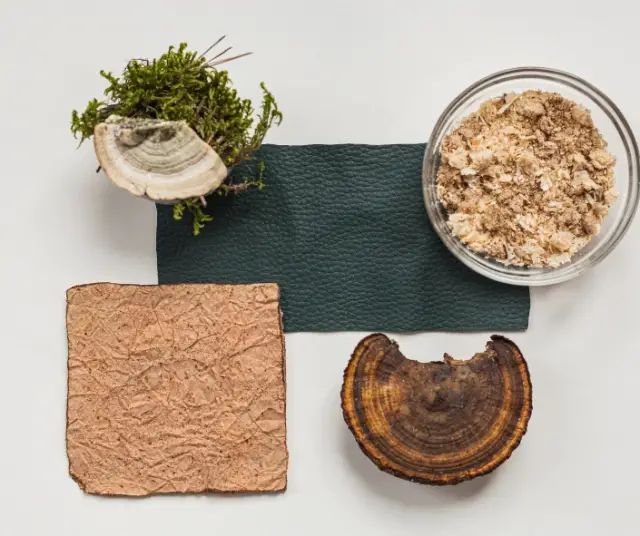In a world where concern for the environment and animal welfare is constantly increasing, the fashion industry faces significant challenges. One of the most debated topics is the use of animal leather in the manufacture of clothing and accessories. However, in recent years, an ethical and sustainable alternative has emerged: vegan leather. This innovative material has gained popularity among conscious consumers, offering an animal and environmentally friendly option without compromising on style or quality.
What is Vegan Leather?
Vegan leather, also known as synthetic leather or eco-leather, is a revolutionary material that has gained prominence in the fashion industry and beyond. It is distinguished by its ability to replicate the aesthetic and functional qualities of traditional leather, but with a fundamental difference: it does not involve the exploitation or sacrifice of animals. Instead of using the skins of cows, sheep or other animals, vegan leather is produced from a variety of synthetic or plant materials, such as polyurethane, pineapple, hemp, cork or cotton.
This innovative material not only offers an ethical alternative for consumers concerned about animal welfare, but also presents significant advantages from an environmental and design perspective. First, vegan leather reduces dependence on limited natural resources and decreases pollution associated with animal husbandry and conventional leather tanning processes. By using synthetic or vegetable materials, more sustainable and responsible production is encouraged, in line with the demands of an increasingly environmentally conscious world.
Additionally, vegan leather offers a wide range of design and customization possibilities. Due to its synthetic nature, it can be manufactured in a variety of colors, textures and finishes, allowing designers to explore new ideas and trends without compromising quality or aesthetics. This not only provides greater creative freedom, but also opens the doors to unique and exclusive styles that can appeal to a broader and more diverse consumer base.
Production process
Vegan leather is manufactured through various processes, depending on the material used. For example, polyurethane is processed into sheets using molding and finishing techniques to imitate the texture and appearance of animal leather. On the other hand, materials such as pineapple, hemp or cork are obtained from plant sources and are processed in a similar way to animal leather, through tanning and treatment to improve their durability and aesthetic appearance.
Advantages of Vegan Leather
Vegan leather offers a number of benefits to both consumers and the environment:
Animal Ethics: One of the main advantages of vegan leather is that it does not involve the exploitation or suffering of animals. This makes it an ethical choice for consumers who care about animal welfare.
Environmental Sustainability : Vegan leather production typically has a lower environmental impact compared to animal leather. By using synthetic or plant-based materials, dependence on limited natural resources is reduced and pollution associated with animal husbandry and conventional leather tanning processes is reduced.
Variety of Designs: Vegan leather offers a wide range of design and customization possibilities. Due to its synthetic nature, it can be manufactured in a variety of colors, textures and finishes, allowing designers to explore new ideas and trends without compromising quality or aesthetics.
Durability and Resistance: Vegan leather is often just as durable and resistant as animal leather, ensuring the longevity of clothing and accessories made from this material.
Affordability: In many cases, vegan leather is more affordable in terms of cost compared to animal leather, making it a more affordable option for budget-conscious consumers.
Challenges and Criticisms
Despite its numerous advantages, vegan leather is not without its challenges and criticisms:
Environmental Impact of Synthetic Materials: Although vegan leather can reduce the environmental impact compared to animal leather, some synthetic materials used in its manufacture, such as polyurethane, can still generate waste and contaminants during their production and decomposition.
Varied Quality and Durability: The quality and durability of vegan leather can vary depending on the type of material used and the manufacturing process. Some vegan leather products may be less durable or prone to wearing out faster than high-quality animal leather.
Customization Limitations: Despite offering a variety of design options, vegan leather may have limitations in terms of customization and handling compared to animal leather. Some finishing effects, such as natural aging, can be difficult to replicate on vegan leather.
Inferior Quality Perception: Although the quality of vegan leather has improved considerably in recent years, some consumers may still perceive it as an inferior substitute for animal leather in terms of luxury and prestige.
Impact on the Fashion Industry
Growing interest in sustainability and animal welfare has led to an increase in demand for vegan leather products in the fashion industry. Many brands and designers are embracing vegan leather as an ethical and sustainable alternative to animal leather, incorporating it into their collections of clothing, footwear and accessories. This trend has driven innovation and competition in the market, encouraging the development of new materials and technologies to improve the quality and versatility of vegan leather.
Additionally, the growth of the vegan movement and environmental awareness among consumers are influencing purchasing decisions, driving brands to adopt more responsible and transparent practices throughout their supply chain. As a result, the vegan leather market is expected to continue expanding in the coming years, offering new opportunities for innovation and collaboration in the fashion industry.
